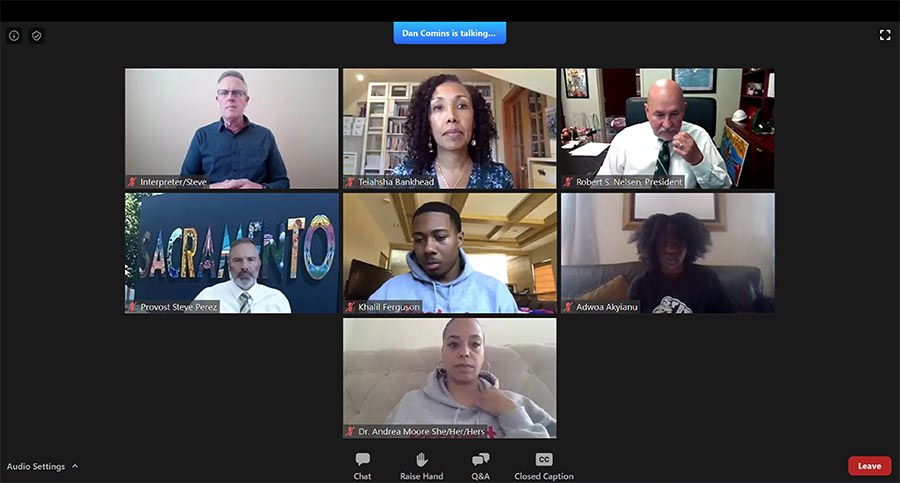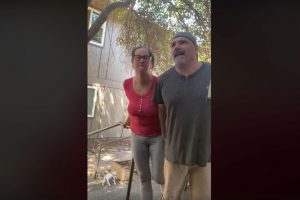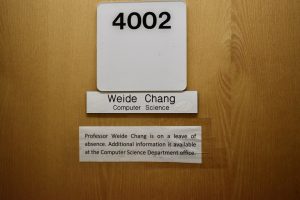BSU president presses Sac State to fire professor seen arguing with neighbors
President Nelsen apologizes for saying altercation will not be discussed publicly
Screenshot via Zoom
The virtual town hall participants and interpreters check their video cameras before the beginning of the event Tuesday, May 19, 2020. Sacramento State held a virtual town hall where administrators and community members spoke on how the campus can respond to racism.
May 19, 2020
The president of Sacramento State’s Black Student Union pressed administrators to fire the professor seen in a viral video where his wife used racial slurs.
Sac State BSU president Adwoa Akyianu called for the professor’s firing on Tuesday during a virtual town hall hosted by Sac State, which aimed to address how the campus responds to personnel issues and discuss how Sac State can respond to racial bias.
The town hall was the latest in Sac State’s response to a viral video featuring economics professor Tim Ford and his wife arguing with their neighbors. In the video, Ford’s wife uses a racial slur and Ford throws a drink at his neighbors’ home after announcing that he works at Sac State.
The university announced the town hall hours after Sac State President Robert Nelsen sent a SacSend email saying the school would not discuss the incident publicly further. He apologized for that statement at the town hall.
Story continues below tweet.
“I wrote, ‘The altercation is a personnel matter that the university is investigating, and we will not address it again publicly.’ I should never have written that sentence, and I apologize for it,” @PrezNelsen said. @TheStateHornet
— Chris Wong (@ChrisWongWrites) May 19, 2020
“Words matter. The words I used could easily be understood to say that the university and I in particular were going to be silent about what we should never be silent about,” Nelsen said.
Akyianu said Nelsen’s original statement saying the incident would not be addressed publicly anymore communicates that Sac State values policy more than its students.
“I think my community is done accepting apologies,” Akyianu said.
Akyianu said she wants an action-oriented apology, including Tim Ford’s firing, a zero-tolerance racism policy to set precedent for future incidents of racism and mandated cultural responsiveness training that students have a hand in creating.
Sac State’s California Faculty Association and social work department also made statements at the meeting.
Andrea Moore is an associate professor of ethnic studies and Sac State’s racial and social justice representative for the CFA.
Speaking for the CFA, she said that though space is given to discuss issues of racism at Sac State, the task of acting on it is relegated to the students and faculty affected by the issues in what the CFA calls “cultural taxation.”
Akyianu called the issue “racial taxation.” For her, time spent rectifying racial issues takes time away from her studies, an issue she said white students do not face.
“For every moment that I have to address my community, for every meeting that I have to organize and be in, is every moment that my white counterparts were studying for finals, every moment that they could dedicate to their academic success that we don’t get the privilege to,” Akyianu said.
Teiahsha Bankhead, associate professor of social work, read a statement from the division of social work condemning Ford.
“The culture and climate of Sac State is now being seen as a hostile place for students of color who are not able to receive a fair chance and equitable education — directly due to professors who abject biases and prejudices and who so willfully engage in racist and oppressive behaviors,” Bankhead said.
Bankhead also said that alcohol or drug use is not an acceptable excuse for Ford’s wife’s actions. Ford had previously apologized for his wife’s use of a racial slur and said she checked in to a hospital for alcohol and drug abuse.
RELATED: Sac State professor apologizes for video featuring racial slurs, petition circulates for his removal
“Alcoholism and drug addiction do not excuse harmful acts of verbal abuse, intimidation and violence against people of color,” Bankhead said.
Diana Tate Vermeire, the university diversity officer and vice president of inclusive excellence, acknowledged some students’ concerns that the video represents a larger issue of racism on campus.
“I know that some individuals join our virtual town hall today and see the video as an isolated incident,” Vermeire said. “But many others see it as one in a long line of incidents where we realize that we have not reached our goals of inclusion, that we have not sent the message that we all belong.”
Steve Perez, provost and vice president of academic affairs, outlined Sac State’s process for reviewing complaints against faculty.
First, the college leadership, Office of Faculty Advancement and relevant administrator for labor issues has a role in determining if any laws or policies were violated in the misconduct involved in the complaint, Perez said.
The Office of Equal Opportunity also has a role if the complaint relates to discrimination, harassment, retaliation or sexual misconduct, Perez added.
“Once OEO is satisfied that they fully understand the complaint, they determine whether the allegations taken as true are a violation of law or policy,” Perez said.
If the allegations constitute a potential violation, the OEO investigates, Perez said.
The Office of Faculty Advancement and administrator for labor issues use similar processes to the OEO’s, Perez said.
He said following that, a decision is made on the appropriate corrective or disciplinary action, and the employee is notified what the action is and the effective date.
Perez said whether or not the allegations have been sustained are confidential and that Sac State is limited in what information it can release to complainants.




































































































































Brianna Davis • Jun 21, 2020 at 1:51 pm
This isn’t about being offended here and there, this isn’t about a dispute between two neighbors. This is about members of the sac state community using racial slurs against other members of the community. It doesn’t matter what either party is doing to the other, it isn’t about who is right and wrong about whatever their neighbor issues are. No one should ever be treated the way that Cob was, no one should ever say the things that Tim and Crystal Ford said, under any circumstances.
The president of the BSU is completely justified in taking this issue seriously, in fact, it’s everyone’s responsibility to take this seriously.
The first amendment isn’t there to protect people who say racist things.
Zeus • Jun 18, 2020 at 7:22 am
It is certainly true that one cannot hold a man accountable for his wife’s actions, yet the professor does not do anything to stop his wife’s racist rant. Instead he throws his drink at the man she is verbally abusing, then walks away holding her hand in solidarity. This is racism, and the multiple comments here defending his behavior show racism is alive and well at Sac State. That is why the professor should be fired, and also because his wife has nystagmus in the video and is thus under the influence of something more than just alcohol. One cannot hold the professor accountable for that either, but if his wife is getting high, then then professor is almost certainly getting high as well. How is the university addressing this? Is that something President Nelsen does not want to discuss?
Ricardo Viveros • May 22, 2020 at 11:43 am
for the idiots that don’t get it. Professor Ford’s responsibility to maintain inclusiveness and take reasonable actions as an educator and mandated reporter do not cease at the end of the day and they carry over to his actions in the private/public world…Furthermore, I am sure he has had to go through some type of training on privilege awareness. Privilege that he is not aware that he has as a white, Ph.d. holding, racist wife marrying man that he is when he pointed out that he as a Ph.d and threw his beer at the window…actions not indicative of a professor from sac state with the message of diversity and inclusion on their mind
James Lucas • May 20, 2020 at 8:09 pm
Ok just so I’m clear about this, she wants the professor fired not for what he said but for what his wife said? Is the university really that stupid to open themselves up to a lawsuit that they are almost certain to lose? Putting aside the 1st amendment aspect, how would they even justify punishing him for the action of another? The university should just tell the truth, no they are not going to do anything because it’s a private matter and the professor did nothing wrong.
Jon • May 20, 2020 at 2:43 pm
I was supposed to get a reminder for the town-hall since I signed up for it. But anyway, the president of the BSU is full of themselves, with everything that’s going in the world, I think we have bigger problems than a dispute between two neighbors. And I think shes giving me” mental taxation”, me having to hear the BS shes saying. I’m tired of all this race baiting and nelson should never even have brought this issue up.
John • May 20, 2020 at 12:22 pm
I am seriuosly sick of the nut jobs in the black community whining about anything that they choose. They have become the spoiled brats of society.
I am offended every single day by what some people do and say.
….and so what?
Killer Marmot • May 20, 2020 at 11:24 am
And what is Professor Ford guilty of? Marrying the wrong person? The BSU is overplaying their hand. They seem to want blood for blood’s sake, without rhyme or reason.